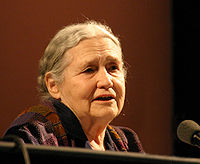
Hi everybody! I am sure you have had time to rest and study hard, even if you have a family to look after or a demanding job.
For the next days we are going to focus on a great writer:
Doris Lessing. Her novel The Golden Notebook caused a great impression in my generation. This novel, which I strongly recommend, is also about societal and mental breakdown. I didn't choose it for the course because it is too long,but if you enjoyed The Grass is Singing, you will enjoy it as well.
Remember, successful reading results from the understanding you bring to a text, which is often based on previous knowledge. So try to read in order to understand the overall meaning of the text.
The process is double: bottom up and top down: Constructing meaning is not just understanding words and sentences in a text. It involves a connection between those words and sentences and the meanings which arise from your expectations and the knowledge you have about content and structure. So the best thing is to combine top down and bottom up processes and strategies. Discussing the topic, relating what happens in the book to what you know, to your own experiences and situations will help you to benefit from the reading.
Activities:
1. Provide a title for wach chapter
2. Summarize each chapter in three sentences.
3. Write a composition about what will happen next.
4. Write a composition about a different ending to the story.
5. Discuss what punishment to give to the criminal.
6. Discuss what advice would you have given Mary if you had had the opportunity.
7. Discuss each of the characters in the story.
8. Discuss significant bits of the story.
9. Discuss possible reasons for D.L. to write this book.
10. Give a reasoned opinion to another student who might read this book next year.
11. Write a book review.
12. Make a note of interesting expressions to learn and their meaning in English (quote page and paragraph). For example: Perhaps he had got cold feet and run away. (p. 14, par.3)
----------------
Now playing:
http://www.sabanciuniv.edu/do/eng/PodCast/files/podcast69.mp3via
FoxyTunes




